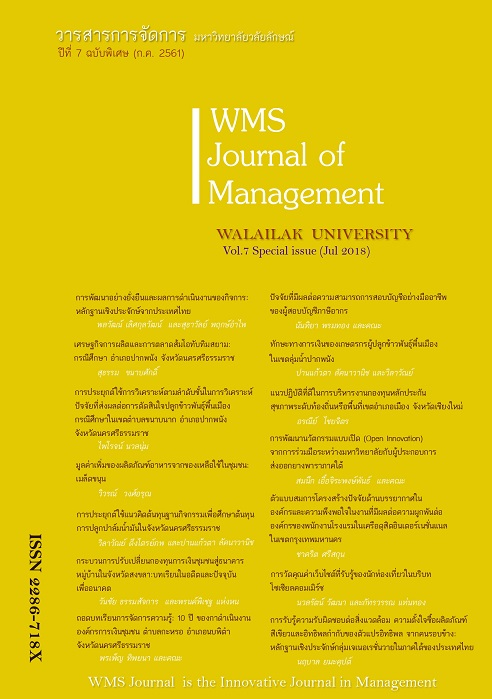The Structural Equation Modeling of Organizational Climate Factors and Job Satisfaction Affecting Employee Engagement of Hotel Employees of Dusit International Group in Bangkok
Main Article Content
Abstract
This paper aims to investigate the structural relationship of organizational climate factors and job satisfaction affecting employee engagement of hotel employees of Dusit International Group in Bangkok by employing structural equation modeling technique to demonstrate and describe the impact in terms of direct and indirect effect on employee engagement. The comprises of 265 employees of Dusit Thani Bangkok and Dusit Thani Princess Srinakarin who had been working for back stage and front stage. This survey research collected the data by questionnaire and analyzed by statistical applications.
The findings revealed that organizational climate had the total impact on employee engagement equal to .83, the direct effect equal to .19 and indirect effect equal to .64 ( 2/df = 2.253, GFI=.895, RMSEA=.069, CFI=.958). Consideration the organizational climate and job satisfaction simultaneously can be enhanced the degrees of employee engagement.
Article Details
References
Allen, D.K. (2003). Organizational climate and strategic change in higher education: Organizational insecurity. Higher Education, 46(1). 61−92.
Asadi, F. (2015). Examine the Relationship Between Organizational Climate and Job Satisfaction Among Teachers of Education Department of Tehran, The City of Qods. Indian Journal of Fundamental and Applied Life Sciences, 5(2). 3215-3224.
Berry, L. M., & Morris, L. M. (2008). The Impact of Employee Engagement Factors and Job Satisfaction on Turnover Intent. Institute of Education Sciences, 1 – 8.
Bhaesajsanguan, S. (2010). The Relationships among Organizational Climate, Job Satisfaction and Organizational Commitment in the Thai Telecommunication Industry. E- leader Singapore journal, 10, 1-15.
Buapeng, P. (2011). Factors Affecting Organizational Commitment of Employee of Daikin Industries Thailand., Ltd. Department of Business Administration. Rajamangala University of Technology Thanyaburi.
Chitthang, S. (2010). Job Satisfaction and Organizational Commitment of Employees of CAT Telecom Public Company Limited of Headquarters. Graduation School, Krirk University.
Danish, Q. A., Draz, U., & Ali, Y. H. (2015). Impact of Organizational Climate on Job Satisfaction and Organizational Commitment in Education Sector of Pakistan. American Institute of Science, 1(2). 102 – 109.
Department of Tourism. (2016). Travel Situation in December 2016. Retrieved August 2, 2016 from http://www.tourism.go.th
Deshwal, S. (2015). A study of job satisfaction in relation to employee engagement. International Journal of Applied Research, 1(9). 303-304.
Dusit International. (2016). About Us. Retrieved May 14, 2016 from https://www.dusit.com/about-us/
Dusit International. (2014). CSR Report 2014. Retrieved May 7, 2016 from http://dtc.listedcompany.com/csr.html
Ghanbari, S., & Eskandari, A. (2012). Organizational Climate, Job Motivation and Organizational Citizenship Behavior. International Journal of Management Perspective, 1(3). 1-14.
Herzberg, F., Mausner, B. & Synderman, B. (1959). The Motivation to Work. John Wiley and Sons Inc., New York, NY.
Hewitt, A. (2015). Aon Hewitt’s model of employee engagement. Retrieved June 1, 2016 from https://apac.aonhewitt.com/
Jyoti, J. (2013). Impact of Organizational Climate on Job Satisfaction, Job Commitment and Intention to Leave: An Empirical Model. Journal of Business Theory and Practice, 1(1).66 – 82.
Kasikorn Research Center. (2015). Bangkok International Travel Fair during the fourth quarter of 2005 Hotels and restaurants receive 18,000 million baht in cash. Retrieved May 1, 2016 from https://www.kasikornresearch.com/
Khumruang, P., & Tonghamchart. K. (2012). Factor Related to the Organizational Commitment of Teaching Staff in Rajabhat Universities. Journal of the Association of Researchers. 17(1). 90-101.
Koch, T. C. (2013). Organizational Climate and Its Effect On Job Engagement: Exploring The Mediating Effect of Employees Level of Job Satisfaction. Graduation School, University of Cape Town.
Lawler, E. (1983). Satisfaction and behavior. In R. Steers & L. Porter (Eds.), Motivation and Work Behavior (pp. 332-345). New York: McGraw-Hill.
Litwin, G.H., & Stringer, R. A. (1968). Motivation and Organizational Climate. Boston:Harvard University Press.
Long, D. (2000). Diagnosing Cultural Barriers to Knowledge Management, The Academy of Management Executive, 14 (4). 113-28.
Manning, M. L., Davidson, M., & Manning, R. L. (2005). Measuring Tourism and Hospitality Employee, Workplace, Perceptions. International Journal of Hospitality Management, 24(1). 75-90.
Markos, S. and Sridevi, M.S. (2010) Employee Engagement The Key to Improving Performance. International Journal of Business and Management, 5, 89-96.
Ministry of Tourism and Sport. (2014). Tourism Authority of Thailand Act, 1979. Retrieved May 1, 2016 from http://www.mots.go.th/
Na- Nan, K., Panich, T., Thipnete, A., & Kulsingh, R. (2016). Influence of Job Characteristics, Organizational Climate, Job Satisfaction and Employee Engagement that Affect the Organizational Citizenship Behavior of Teachers in Thailand. The Social Sciences, 11. 4523-4533.
Naksuk, V., & Kulapool, S. (2012). Job Satisfaction of Personnel in Bureau of Health Administration Ministry of Public Health. Graduation School, North Bangkok University.
Nukul Ung Aree, S. (2012). Job Satisfaction of Employee of Thai Airways International Public Company Limited in case of Employees of Thai Airways International Head Office. Graduation School, University of the Thai Chamber of Commerce.
Pollsrillert, P. (2016). A Structural Equation Modeling of Job Satisfaction Factors Affecting Employee Engagement, Case Study of a State Enterprise. Journal of the Humanities and Social Sciences, Rajapruek University, 2(1), 56-67
Post Up News. (2016). Thailand Tourism Forum 2016. Retrieved May 1, 2016 from http://th.postupnews.com/2016/01/thailand-tourism-forum-2016.html


